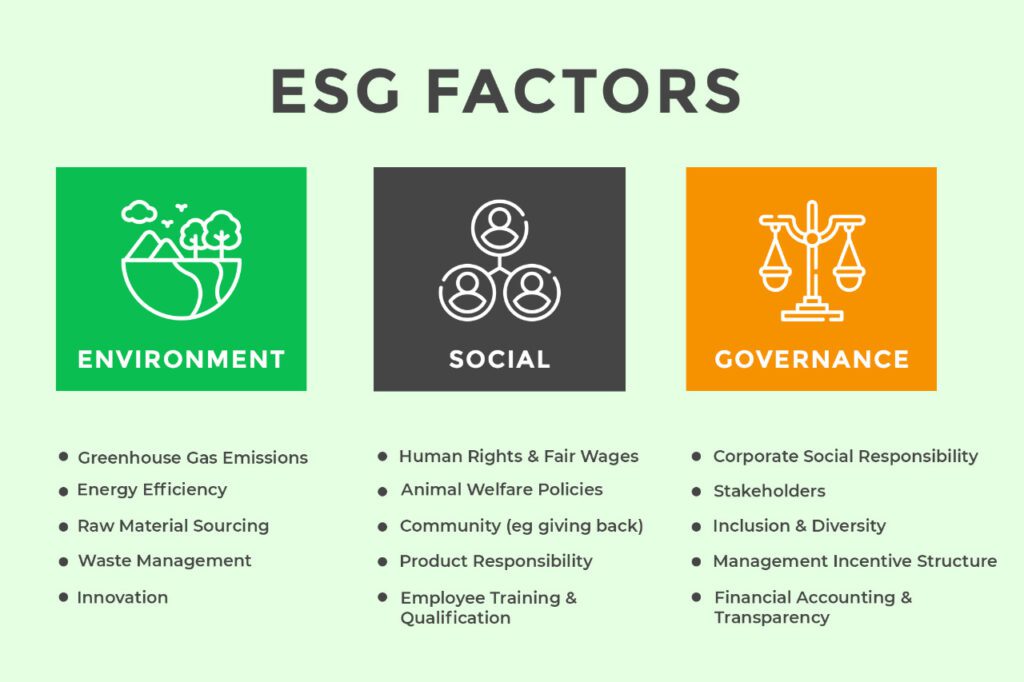Understanding ESG Investing & Its Emergence in India

Don’t need to invest your money in places that fundamentally oppose your values.
In this article
- Introduction
- What is ESG investing?
- Why choose ESG investing?
- ESG Landscape in India
- How to make ESG investments?
By now, you would have heard about sustainability through global organizations, influencers, or environmental activists like Greta Thunberg. The world, especially the millennials and Gen-Zs, are driving sustainable lifestyle changes and are inspired to take action and make an impact. Using less waste at home and office, recycling, shopping from sustainable brands and eco-friendly travel are becoming the norm rather than an exception.
You don’t need to invest your money in places that fundamentally oppose your values {to chase profits}. If your personal belief aligns with sustainable living, your investments should also follow the suit. This is where ESG investing comes in.
ESG investing is a type of sustainable investing, that seeks to generate positive returns for the investors while also considering the long-term impact of their investments on society, the environment, and the mission of the business itself. To put it in simple words, an investment’s ESG score measures the sustainability of investment in three specific categories: environmental, social and {corporate} governance (ESG).
Interest in funds that invest in companies with strong environmental, social, or governance credentials has surged in recent years. The pandemic also raised public awareness of, and support for, social and environmental issues that fall under the ESG purview, such as worker health and safety, and the impact of climate change.
ESG Landscape in India
While ESG funds have gained a lot of traction in developed markets, like the US, they are just starting out in India. Access to reliable data can be challenging in developing markets but that may start to change as ESG funds become more common.
Among the mutual fund companies in India, SBI Magnum Equity ESG Fund was the fund ESG-compliant fund launched in 2018 (a diversified fund turned into an ESG one) and is also the largest ESG fund in India. As of March 2021, the nine ESG funds in India together manage ₹10,900 crores worth of investments, according to data provided by the Association of Mutual Funds of India (AMFI).
What is ESG investing?
ESG investing consists of only investing in companies that promote sustainability. Using the ESG criterion the sustainability and ethics of a company are evaluated while also evaluating the company’s finances, management, and other aspects. For example, a person who chooses to invest in sustainable companies may eschew a traditional automobile company that makes combustion engine vehicles in favour of one that produces electric vehicles.
The ESG Criteria framework consists of three parts:
- Environmental criteria, as the name suggests, focus on how the company manages its effects on the environment and the sustainability initiatives that it drives. It includes things like the company’s energy use, recycling policies, efficient use of natural resources, waste management, tracking carbon footprint, and climate change mitigation steps. It might also assess the company’s efforts to advance renewable energy and design products with the environment in mind.
- Social criteria include how the company treats and interacts with all its stakeholders (employees, customers, vendors), understanding if the company gives back to the communities it operates in, its data privacy policies, and in some cases, it’s animal welfare policies. Providing healthy working conditions, seeking gender equality among employees and on the board, offering training to staff, banning animal testing and the use of animal products, and showing a commitment to charitable endeavours are all strong examples of social initiatives a company may choose.
- Governance criteria are about the management, company’s policies and compliance, the business ethics of the company and how shareholder-friendly the company is. It includes everything from executive pay and diversity in leadership to transparency in communication with shareholders and regular unbiased audits.
ESG criteria are primarily applied to publicly traded companies. Each of the three elements of ESG is comprised of a number of criteria, some of which are highlighted below.

Sustainable investors want to be confident that a company’s environmental (e.g., net zero emissions target), social (e.g., response to the Covid-19 pandemic), and governance (e.g., no repeats of Satyam Computers, Yes Bank or Lehman Brothers) policies and actions are positively impacting the world (now and in the future).
ESG standards can also vary depending on an investor’s personal beliefs. For example, some ESG investors screen out entire industries, like alcohol and companies engaged in animal cruelty, no matter how high they rank on ESG parameters. Such investors may prefer to handcraft their own portfolios because a mutual fund will not allow them the flexibility of kicking out companies that don’t resonate with their personal values.
Why choose ESG investing?
Before we get into the details of why ESG investing, let me first clarify that the primary factor in ESG integration is still financial performance. Now that you are relieved, here’s “WHY ESG INVESTING SHOULD BE PART OF YOUR INVESTMENT STRATEGY“.
Contrary to the common belief that prioritizing ESG factors while choosing investments will negatively affect financial performance, ESG investing is actually a smart call.
ESG investing evaluates how a company serves all its stakeholders: employees (including workers), contractors, customers, communities, shareholders, and the environment. Companies that put in the work to ensure the well-being of all their stakeholders simply become well-run companies. And well-run companies become good investments that keep yielding returns.
Moreover, sustainability issues are now thought of by society as less of an experiment and more of an immediate necessity. Forward-thinking organizations know ESG impacts their overall risk profile. So, the ESG approach to investment inherently reduces your portfolio risk.
How to make ESG investments?
When you are creating your own ESG portfolio, you can consider the following kinds of investments.
1. Individual stocks.
The most flexible and effective way to create a portfolio with an ESG approach is through individual stocks. It allows you to handpick investments that align with your definition of ESG because honestly, there’s not a “one size fits all” approach to ESG investing.
How to pick the right companies? Picking sustainable stocks for your portfolio is essentially no different than choosing any other, there is just an added layer of research involved that considers the ESG factors.
Some companies offer an impact report as part of their annual report or as a separate regular disclosure. This report highlights any sustainable and social initiatives the company has implemented and how it handles issues such as carbon emissions. Going through the company’s website is also a good idea to understand its ESG endeavours. If you want to know how a company scores in terms of its work environment, a third-party site such as Glassdoor is a good place to start. Of course, screening the company’s P&L, and evaluating the health of its balance sheet and other financial metrics is critical.
For novice or newbie investors, it’s usually a good idea to limit the portion of your portfolio that’s in individual stocks simply because you lack the skill and resources to research even a single company (let alone multiple). However, you have other ways to invest in the ESG theme.
2. Mutual funds.
For individual investors who don’t have the expertise in investing in equities, or lack the time of undertaking research and monitoring, mutual funds are a great way to invest in equities. They also diversify your holdings instantly.
Here is a list of the ESG funds available for investing in India, including an ESG ETF:
- Aditya Birla Sun Life ESG Fund.
- Axis ESG Equity Fund.
- ICICI Prudential ESG Fund.
- Invesco India ESG Equity Fund
- Kotak ESG Opportunities Fund.
- Quant ESG Equity Fund.
- Quantum India ESG Equity Fund.
- Mirae Asset ESG Sector Leaders ETF.
- SBI Magnum Equity ESG Fund.
Apart from Indian mutual funds, there are a lot of international ESG funds available. You can explore such funds through platforms that offer investment equities and funds.
Why not start a SIP in a ESG fund for your better financial future?
3. Alternative investment funds
For high-net-worth individuals looking to invest over ₹1 crore, alternate investment funds can be a better option. These are more sophisticated products and offer more flexibility and better service considering its targeted at HNIs. As an investor in AIF, you can directly interact with fund managers, and understand the rationale of stock or sector picking. In many AIFs you also get the flexibility to remove certain sectors of your portfolio like tobacco or alcohol. In India, Avendus has Avendus India ESG Fund.
Investing is like voting. When you choose to invest in a company, you are essentially voting with your rupees for the kind of world you want – one that is driven by corporate greed that disregards the planet, and its people or one that is driven by sustainable growth, where companies work towards profits but place equal importance on ESG factors. By investing in companies with a high ESG rating, and keeping your money out from those who score poorly, you are incentivizing the top executives to do even better.
Besides, positive ESG measures are associated with better overall business performance. Making them good investments.
Being a mindful citizen, my investment strategy incorporates ESG factors, how about you?
Shruti Jain is Chief Strategy Officer (CSO) at Arihant Capital Markets Limited. She is passionate about investor education and sustainability.









hi.sounds interesting but to be precise can you name few companies with their return over a long term investor like me
Also share over the other MFs if invest in Esg fund
As you mentioned in india it’s just started so what’s the track record in countries where it is at matured stage
Hello! You can look at companies like Greenpanel Industries, Mayur Uniquoters, the ongoing EV stock IPO Sona Comstar as they are good investment opportunities in the ESG space. Some of the IT companies have always been strong in their CG and giving back policies and are now incorporating sustainability practices too like Infosys. As for mutual funds, we have listed all ESG funds in the article that are available in India.